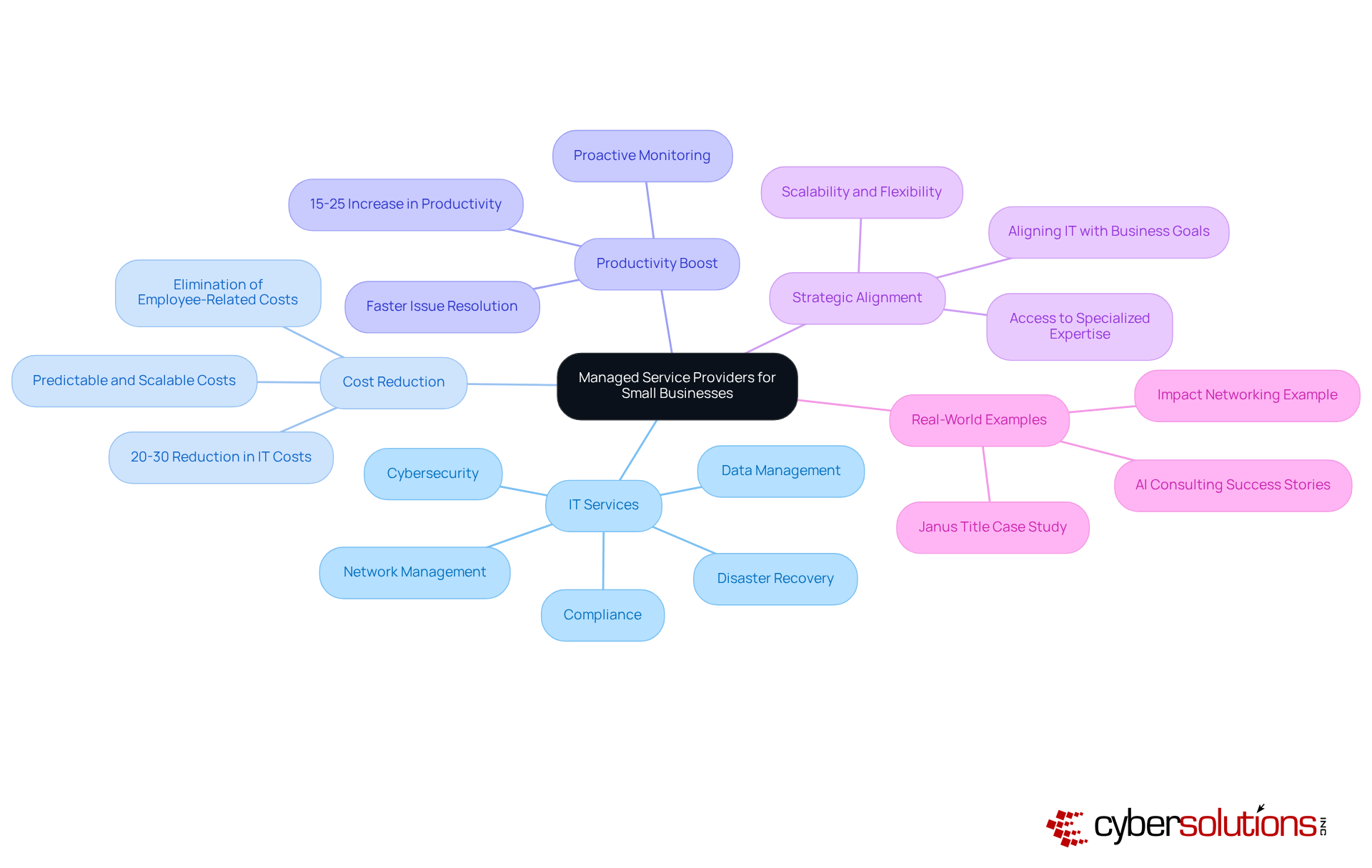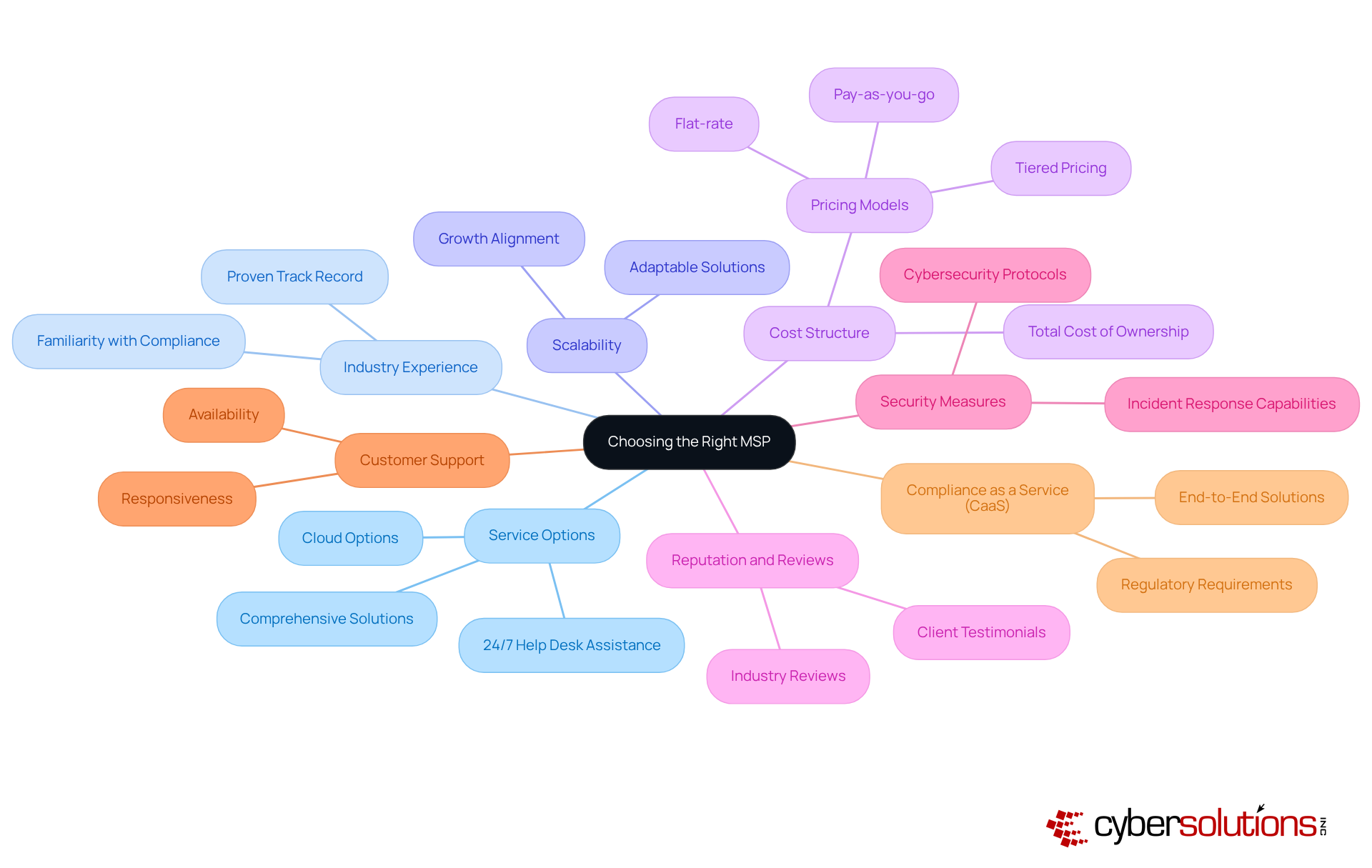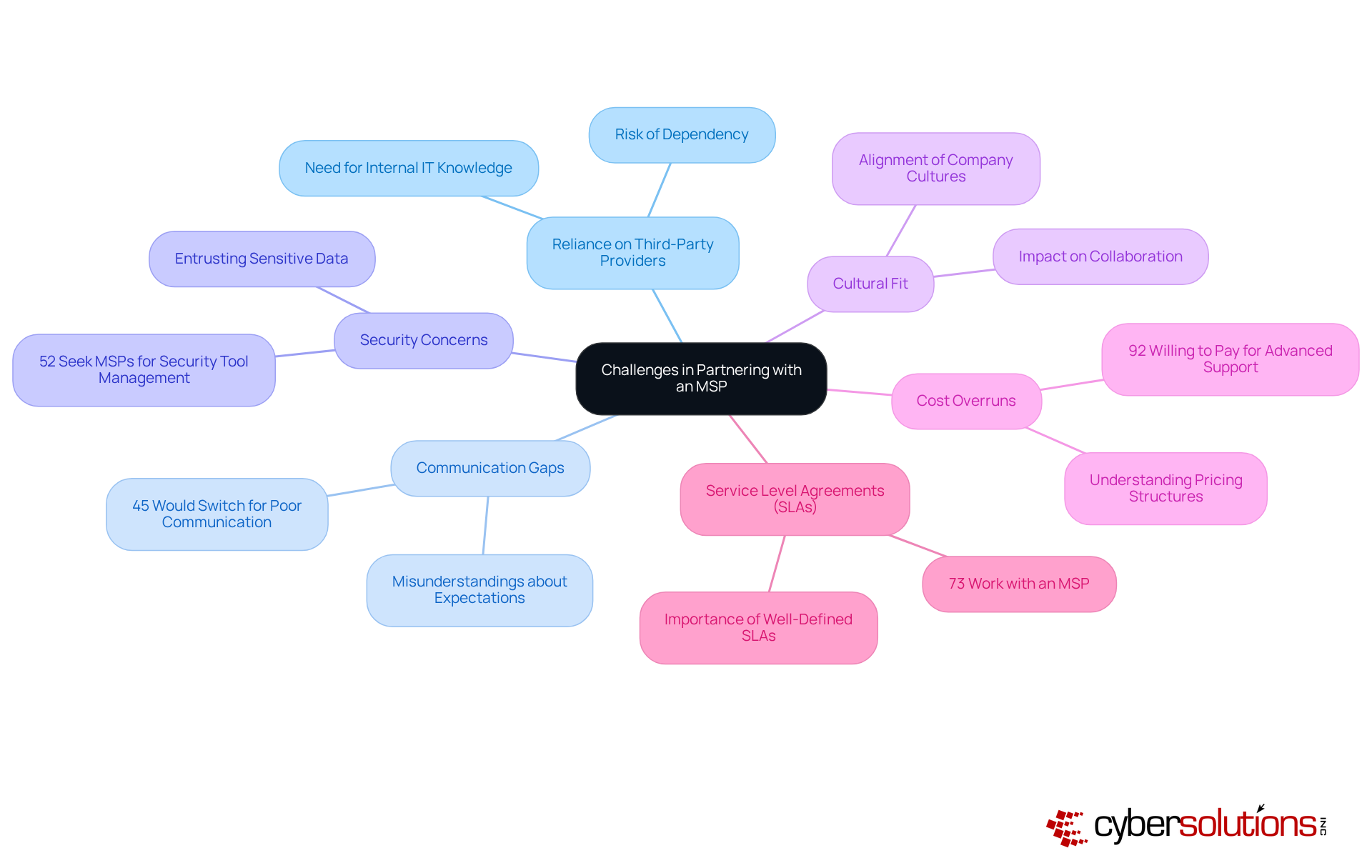September 16, 2025

The article underscores the critical role small businesses play in selecting the most suitable Managed Service Provider (MSP) to bolster their IT infrastructure and security. In today's evolving landscape of cyber threats, it is imperative for these enterprises to evaluate several key criteria:
By meticulously assessing these factors, small businesses can effectively mitigate cyber threats and enhance their operational efficiency, ensuring they remain competitive and secure in a challenging environment.
In an era where digital threats are increasingly prevalent and operational efficiency is crucial, small businesses encounter a pivotal choice: how to adeptly manage their IT requirements. Managed Service Providers (MSPs) present a vital solution, offering specialized IT services that not only bolster security but also enhance productivity and foster growth.
Nevertheless, with a plethora of options at their disposal, how can small enterprises discern the most suitable MSP that aligns with their distinct needs? This article examines the fundamental criteria for selecting the right MSP, investigating the advantages they offer and the potential challenges that may arise in these collaborations, ultimately steering businesses toward making informed decisions in a complex environment.
Managed Service Providers (MSPs) are the best MSP for small business, providing a range of IT services that enable organizations to focus on their core operations. By outsourcing IT functions such as cybersecurity, data management, and compliance with industry regulations like HIPAA and PCI-DSS, enterprises can substantially reduce operational costs while gaining access to specialized expertise. This is increasingly crucial in today's digital landscape, where are not only sophisticated but also pervasive, with over half of minor enterprises that experience a cyber attack shutting down within six months.
MSPs provide comprehensive support that goes beyond basic IT management; they strategically align technology with organizational goals, enhancing productivity and growth potential. For instance, organizations that engage MSPs can lower overall IT costs by 20-30% while boosting productivity by 15-25%. This cost-effectiveness allows minor enterprises to allocate resources more efficiently, prioritizing innovation and customer service, which is why they often seek the best MSP for small business to avoid being bogged down by IT challenges.
Real-world examples underscore the transformative influence of MSPs. For example, Janus Title successfully outsourced its marketing and IT solutions to an MSP, which streamlined operations and enhanced its market presence. Similarly, lesser enterprises utilizing AI consulting through MSPs have been able to uncover significant use cases and adopt advanced technologies without the burden of managing an internal team.
In conclusion, collaborating with the best MSP for small business, such as Cyber Solutions, not only enhances security and compliance—addressing critical standards such as HIPAA and PCI-DSS—but also enables small enterprises to excel in a competitive landscape by ensuring their IT infrastructure is robust, efficient, and aligned with their strategic objectives.

Selecting the best MSP for small business is crucial for enhancing their IT infrastructure and security. The landscape of is evolving, making it imperative for organizations to choose an MSP that can effectively safeguard their operations. Here are key criteria to consider:
By thoroughly assessing these criteria, small enterprises can make informed choices when selecting the best MSP for small business, ultimately enhancing their cybersecurity stance and operational effectiveness.

In today's digital landscape, the importance of cybersecurity in healthcare cannot be overstated. As cyber threats evolve, healthcare organizations face unique challenges that demand robust solutions. This comparative analysis examines several leading MSP providers, focusing on their unique offerings and benefits:
By comparing these providers, minor enterprises can evaluate which is the best MSP for small business that aligns with their operational needs, budget, and industry requirements. Notably, Cyber Solutions Inc. stands out with its tailored services that [enhance operational efficiency and security](https://gocloudwave.com/cloudwave-ranked-15-on-channel-partners-2025-msp-501-the-tech-industrys-most-prestigious-list-of-managed-service-providers-worldwide), making it a preferred choice among healthcare CFOs seeking reliable IT support.

While partnering with the offers numerous benefits, small businesses must remain vigilant regarding potential challenges.
By being aware of these challenges, small businesses can take proactive steps to ensure a successful partnership with the best MSP for small business, especially in leveraging comprehensive firewall and network security solutions like those offered by Cyber Solutions.

Choosing the right Managed Service Provider (MSP) is not just a decision; it is a pivotal strategy for small businesses striving to enhance their IT infrastructure and security. By outsourcing IT functions, organizations can concentrate on their core operations while reaping the benefits of specialized expertise. The significance of selecting an MSP that aligns with specific business needs cannot be overstated; it directly influences operational efficiency and cybersecurity resilience.
This article explores the critical criteria for selecting the best MSP for small businesses, emphasizing essential aspects such as:
Real-world examples illustrate how companies have effectively leveraged MSPs to streamline operations, bolster security, and ensure compliance with regulatory standards. Additionally, it addresses potential challenges in MSP partnerships, highlighting the necessity for clear communication, robust security measures, and well-defined service level agreements to mitigate risks.
Ultimately, the choice of an MSP can profoundly affect a small business's capacity to navigate the complexities of the digital landscape. By meticulously evaluating options and comprehending the unique offerings of leading providers, organizations can forge partnerships that not only enhance their operational capabilities but also strengthen their defenses against evolving cyber threats. Embracing this proactive approach is essential for small businesses to remain competitive and secure in an increasingly challenging environment.
What are Managed Service Providers (MSPs)?
Managed Service Providers (MSPs) are organizations that offer a range of IT services to help businesses focus on their core operations by outsourcing functions like cybersecurity, data management, and compliance with industry regulations.
Why are MSPs important for small businesses?
MSPs are important for small businesses because they help reduce operational costs, provide access to specialized expertise, and enhance productivity and growth potential, especially in a landscape filled with sophisticated cyber threats.
How can MSPs reduce costs for small businesses?
Engaging MSPs can lower overall IT costs by 20-30%, allowing small businesses to allocate resources more efficiently and prioritize innovation and customer service.
What impact do MSPs have on productivity?
Businesses that work with MSPs can boost their productivity by 15-25%, which helps them operate more effectively and focus on strategic objectives.
Can you provide examples of how MSPs have benefited businesses?
One example is Janus Title, which outsourced its marketing and IT solutions to an MSP, streamlining operations and enhancing its market presence. Additionally, smaller enterprises using AI consulting through MSPs have adopted advanced technologies without the burden of managing an internal team.
What compliance standards do MSPs help address?
MSPs assist small businesses in ensuring compliance with critical standards such as HIPAA and PCI-DSS, which are essential for maintaining security and regulatory adherence.
How do MSPs align technology with organizational goals?
MSPs strategically align technology with the goals of an organization, ensuring that the IT infrastructure is robust, efficient, and supports the business's overall objectives.